硕士论文答辩sharing economy 共享经济商业模式 (汽车共享)
2020年最新关于共享经济的英语作文
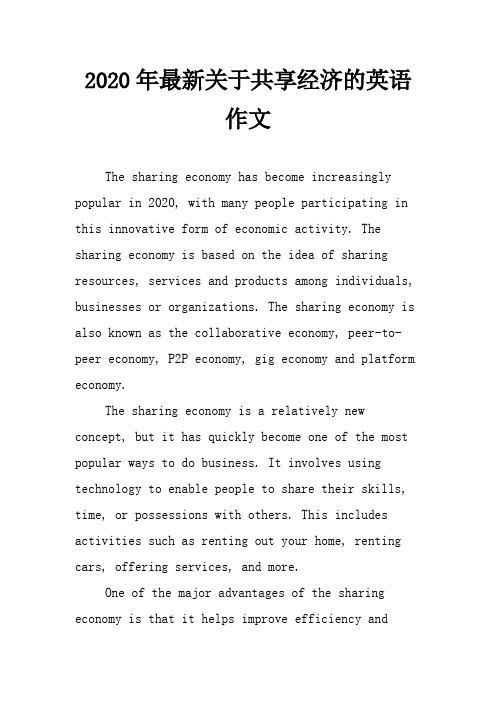
2020年最新关于共享经济的英语作文The sharing economy has become increasingly popular in 2020, with many people participating in this innovative form of economic activity. The sharing economy is based on the idea of sharing resources, services and products among individuals, businesses or organizations. The sharing economy is also known as the collaborative economy, peer-to-peer economy, P2P economy, gig economy and platform economy.The sharing economy is a relatively new concept, but it has quickly become one of the most popular ways to do business. It involves using technology to enable people to share their skills, time, or possessions with others. This includes activities such as renting out your home, renting cars, offering services, and more.One of the major advantages of the sharing economy is that it helps improve efficiency andreduce costs by eliminating the need for middlemen. The sharing economy can also help to create jobs, as people are able to monetize their skills or possessions. In addition, the sharing economy has been credited with providing access to goods and services that would otherwise be unavailable or too expensive.The sharing economy also has its drawbacks. For example, there can be issues around quality control and safety, as well as concerns about how companies handle data. Additionally, some worry that the sharing economy could lead to the exploitation of workers, as companies may use the platform to pay less than minimum wage.Despite these challenges, the sharing economy has become an integral part of our lives. As the world continues to embrace the sharing economy, we can expect to see even more innovative ways to share resources and services, as well as increased consumer choice. So, while there may be some challenges to address, the sharing economy islikely here to stay.。
共享经济的英语作文
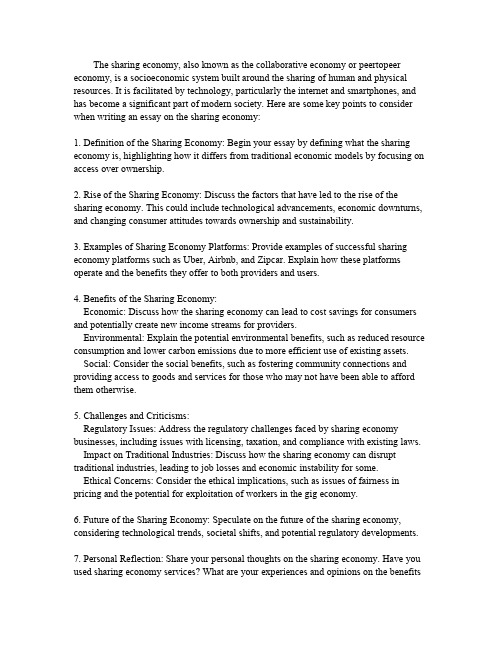
The sharing economy,also known as the collaborative economy or peertopeer economy,is a socioeconomic system built around the sharing of human and physical resources.It is facilitated by technology,particularly the internet and smartphones,and has become a significant part of modern society.Here are some key points to consider when writing an essay on the sharing economy:1.Definition of the Sharing Economy:Begin your essay by defining what the sharing economy is,highlighting how it differs from traditional economic models by focusing on access over ownership.2.Rise of the Sharing Economy:Discuss the factors that have led to the rise of the sharing economy.This could include technological advancements,economic downturns, and changing consumer attitudes towards ownership and sustainability.3.Examples of Sharing Economy Platforms:Provide examples of successful sharing economy platforms such as Uber,Airbnb,and Zipcar.Explain how these platforms operate and the benefits they offer to both providers and users.4.Benefits of the Sharing Economy:Economic:Discuss how the sharing economy can lead to cost savings for consumers and potentially create new income streams for providers.Environmental:Explain the potential environmental benefits,such as reduced resource consumption and lower carbon emissions due to more efficient use of existing assets. Social:Consider the social benefits,such as fostering community connections and providing access to goods and services for those who may not have been able to afford them otherwise.5.Challenges and Criticisms:Regulatory Issues:Address the regulatory challenges faced by sharing economy businesses,including issues with licensing,taxation,and compliance with existing laws. Impact on Traditional Industries:Discuss how the sharing economy can disrupt traditional industries,leading to job losses and economic instability for some.Ethical Concerns:Consider the ethical implications,such as issues of fairness in pricing and the potential for exploitation of workers in the gig economy.6.Future of the Sharing Economy:Speculate on the future of the sharing economy, considering technological trends,societal shifts,and potential regulatory developments.7.Personal Reflection:Share your personal thoughts on the sharing economy.Have you used sharing economy services?What are your experiences and opinions on the benefitsand drawbacks?8.Conclusion:Summarize the main points of your essay,reiterating the significance of the sharing economy in contemporary society and the potential it has to shape the future of economic transactions.Remember to structure your essay with a clear introduction,body paragraphs that explore each point in detail,and a conclusion that ties everything e evidence and examples to support your arguments and make your essay engaging and informative.。
共享经济英文议论作文
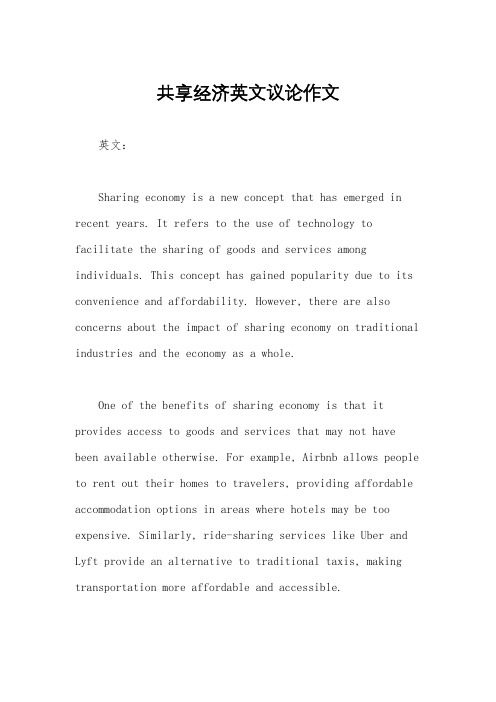
共享经济英文议论作文英文:Sharing economy is a new concept that has emerged in recent years. It refers to the use of technology to facilitate the sharing of goods and services among individuals. This concept has gained popularity due to its convenience and affordability. However, there are also concerns about the impact of sharing economy on traditional industries and the economy as a whole.One of the benefits of sharing economy is that it provides access to goods and services that may not have been available otherwise. For example, Airbnb allows people to rent out their homes to travelers, providing affordable accommodation options in areas where hotels may be too expensive. Similarly, ride-sharing services like Uber and Lyft provide an alternative to traditional taxis, making transportation more affordable and accessible.However, the rise of sharing economy has also raised concerns about its impact on traditional industries. For example, the hotel industry has been affected by the rise of Airbnb, as more people choose to stay in private homes rather than hotels. This has led to calls for regulation of sharing economy platforms to ensure a level playing field.In addition, there are concerns about the impact of sharing economy on the overall economy. Some argue that sharing economy platforms are contributing to the growth of the gig economy, where workers are hired on a short-term or freelance basis, without the benefits and protections of traditional employment. This could lead to a widening income gap and a decline in the standard of living for workers.In conclusion, sharing economy has both benefits and drawbacks. While it provides access to affordable goods and services, it also raises concerns about its impact on traditional industries and the economy as a whole. It is important for policymakers to carefully consider the implications of sharing economy and develop regulationsthat promote fairness and protect workers.中文:共享经济是近年来出现的一个新概念。
共享经济的利与弊英文作文
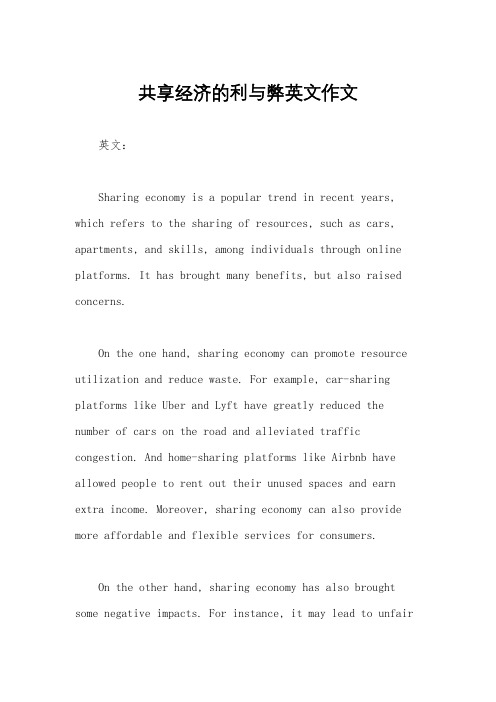
共享经济的利与弊英文作文英文:Sharing economy is a popular trend in recent years, which refers to the sharing of resources, such as cars, apartments, and skills, among individuals through online platforms. It has brought many benefits, but also raised concerns.On the one hand, sharing economy can promote resource utilization and reduce waste. For example, car-sharing platforms like Uber and Lyft have greatly reduced the number of cars on the road and alleviated traffic congestion. And home-sharing platforms like Airbnb have allowed people to rent out their unused spaces and earn extra income. Moreover, sharing economy can also provide more affordable and flexible services for consumers.On the other hand, sharing economy has also brought some negative impacts. For instance, it may lead to unfaircompetition and tax evasion. Some sharing economy platforms do not comply with regulations and do not pay taxes, which may harm the interests of traditional businesses and the government. Additionally, sharing economy may also raise privacy and security concerns, as people need to sharetheir personal information and belongings with strangers.In my opinion, sharing economy is a double-edged sword. It can bring many benefits, but also pose challenges and risks. Therefore, we need to strike a balance between innovation and regulation, and ensure that sharing economy operates in a fair and responsible manner.中文:共享经济是近年来的一个流行趋势,它指的是通过在线平台在个人之间共享资源,如汽车、公寓和技能。
共享经济英文作文150

共享经济英文作文150英文:Sharing economy is a new business model that has gained popularity in recent years. It is a system in which individuals can share their resources with others for a fee. This can include anything from renting out a spare room on Airbnb to sharing a car on Uber.The sharing economy has many benefits. It allows people to make extra money by sharing their resources. It also provides a more affordable alternative for consumers. For example, instead of paying for an expensive hotel room, a traveler can rent a room from a local resident for afraction of the cost.However, there are also some drawbacks to the sharing economy. One concern is safety. When using a sharing economy platform, it can be difficult to determine whether the person you are dealing with is trustworthy.Additionally, there may be issues with insurance andliability if something goes wrong.Overall, the sharing economy has its pros and cons. It can be a great way to save money and make extra income, but it is important to use caution and be aware of thepotential risks.中文:共享经济是近年来流行起来的一种新的商业模式。
论共享经济英语作文

论共享经济英语作文The Rise of the Sharing Economy。
In recent years, the concept of the sharing economy has gained significant momentum, revolutionizing the way people consume goods and services. The sharing economy, also known as collaborative consumption, is a socio-economic system built around the sharing of human and physical resources. This trend has been largely driven by the rise of digital platforms, which have made it easier for individuals to connect and share resources with one another. In this essay, we will explore the benefits and challenges of the sharing economy, as well as its potential impact on society.One of the key benefits of the sharing economy is its potential to reduce waste and promote sustainability. By sharing resources such as cars, homes, and tools,individuals can make more efficient use of existing assets, reducing the need for new production and consumption. This not only helps to minimize environmental impact, but alsoallows people to save money and access goods and services that they may not be able to afford on their own. For example, car-sharing services like Zipcar and Turo allow individuals to rent vehicles on an as-needed basis, reducing the need for personal car ownership and the associated costs and environmental impact.Furthermore, the sharing economy has the potential to create new economic opportunities and empower individuals. Through platforms like Airbnb and Uber, people can generate income by renting out their homes or providing transportation services. This has allowed many individuals to supplement their income or even turn sharing into afull-time business. Additionally, the sharing economy has the potential to provide access to goods and services in underserved communities, bridging the gap between supply and demand in areas where traditional businesses may not operate.However, the sharing economy is not without its challenges. One of the main concerns is the potential for exploitation and inequality. As the sharing economy relieson individuals to provide goods and services, there is a risk that workers may be exploited or underpaid, especially in the absence of traditional labor protections and regulations. Additionally, the rise of sharing economy platforms has raised questions about issues such as data privacy, consumer protection, and the impact on traditional industries. For example, the rise of ride-sharing services has led to conflicts with traditional taxi companies and regulatory challenges in many cities.In conclusion, the sharing economy has the potential to bring about significant social and economic benefits, from promoting sustainability and reducing waste to creating new economic opportunities and empowering individuals. However, it also presents challenges that need to be addressed, such as ensuring fair labor practices and protecting consumer rights. As the sharing economy continues to evolve, it will be important for policymakers, businesses, and individuals to work together to ensure that it is harnessed for the greater good of society. Only then can the full potential of the sharing economy be realized.。
共享经济看法英语作文
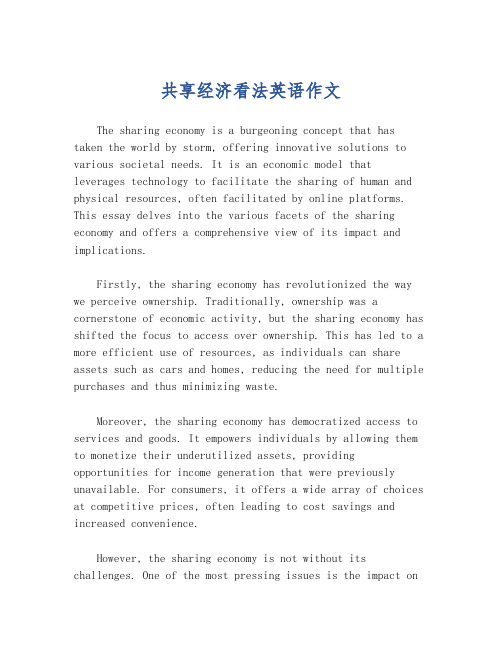
共享经济看法英语作文The sharing economy is a burgeoning concept that has taken the world by storm, offering innovative solutions to various societal needs. It is an economic model that leverages technology to facilitate the sharing of human and physical resources, often facilitated by online platforms. This essay delves into the various facets of the sharing economy and offers a comprehensive view of its impact and implications.Firstly, the sharing economy has revolutionized the way we perceive ownership. Traditionally, ownership was a cornerstone of economic activity, but the sharing economy has shifted the focus to access over ownership. This has led to a more efficient use of resources, as individuals can share assets such as cars and homes, reducing the need for multiple purchases and thus minimizing waste.Moreover, the sharing economy has democratized access to services and goods. It empowers individuals by allowing them to monetize their underutilized assets, providing opportunities for income generation that were previously unavailable. For consumers, it offers a wide array of choices at competitive prices, often leading to cost savings and increased convenience.However, the sharing economy is not without its challenges. One of the most pressing issues is the impact ontraditional industries. The disruption caused by sharing platforms has led to job losses and economic displacement in sectors like hospitality and transportation. Additionally, there are concerns about the lack of regulation and oversight, which can lead to issues such as safety, privacy, and fair competition.Furthermore, the environmental impact of the sharing economy is a double-edged sword. While it promotes theefficient use of resources, there is also a risk of increased consumption and waste if not properly managed. The sharing economy must strive for sustainable practices to ensure thatit contributes positively to environmental conservation.In conclusion, the sharing economy presents a paradigmshift in how we approach consumption and ownership. It offers numerous benefits, such as increased efficiency,accessibility, and economic opportunities. However, it also presents challenges that must be addressed through thoughtful regulation and sustainable practices. As the sharing economy continues to evolve, it is crucial for stakeholders to work together to harness its potential while mitigating its drawbacks.。
共享经济作文 英文

共享经济作文英文英文:Sharing economy is a new trend in the world of business. It is a type of economy where individuals share their resources with others, usually through online platforms. This type of economy has been growing in popularity in recent years due to its many benefits.One of the benefits of sharing economy is that it is cost-effective. For example, instead of buying a car, I can use a car-sharing service to rent a car when I need it.This saves me money on car payments, insurance, and maintenance. Another benefit is that it promotes sustainability. By sharing resources, we can reduce waste and conserve natural resources.However, there are also some challenges to sharing economy. One challenge is that it can be difficult to regulate. Since sharing economy is often based on peer-to-peer transactions, it can be hard to ensure that allparties are following the rules. Another challenge is thatit can lead to job loss in certain industries. For example, if people start sharing cars instead of buying them, it could lead to a decrease in car sales and job losses in the automotive industry.Overall, I believe that sharing economy is a positive trend. It has the potential to save people money, promote sustainability, and foster a sense of community. However,it is important to address the challenges and ensure that sharing economy is regulated in a fair and effective manner.中文:共享经济是商业世界中的一种新趋势。
共享经济优点英文作文
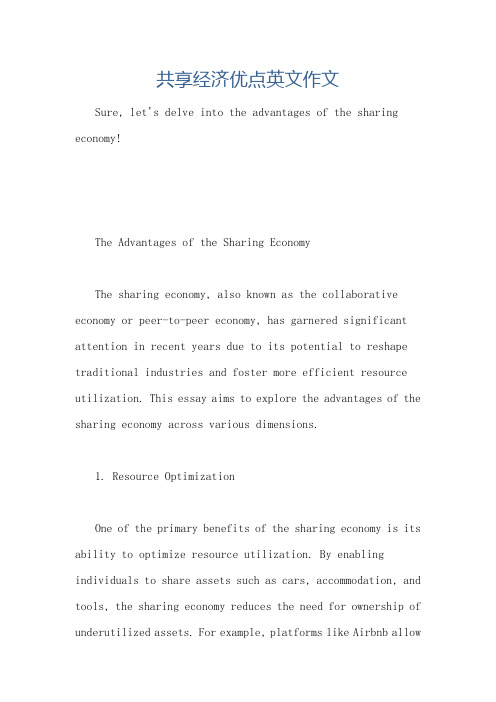
共享经济优点英文作文Sure, let's delve into the advantages of the sharing economy!The Advantages of the Sharing EconomyThe sharing economy, also known as the collaborative economy or peer-to-peer economy, has garnered significant attention in recent years due to its potential to reshape traditional industries and foster more efficient resource utilization. This essay aims to explore the advantages of the sharing economy across various dimensions.1. Resource OptimizationOne of the primary benefits of the sharing economy is its ability to optimize resource utilization. By enabling individuals to share assets such as cars, accommodation, and tools, the sharing economy reduces the need for ownership of underutilized assets. For example, platforms like Airbnb allowhomeowners to monetize their spare space, while car-sharing services like Zipcar enable multiple users to access vehicles without the need for individual ownership. This leads to more efficient use of resources, lower costs for consumers, and reduced environmental impact through fewer redundant purchases and decreased carbon emissions.2. Cost SavingsParticipating in the sharing economy often translates to cost savings for both providers and consumers. Individuals can earn extra income by renting out their idle assets, while consumers can access goods and services at a fraction of the cost of traditional ownership or rental. For instance, ridesharing services like Uber and Lyft typically offer fares lower than traditional taxi services, while peer-to-peer lending platforms provide borrowers with access to loans at competitive interest rates. These cost savings increase affordability and accessibility, particularly for individuals with limited financial resources.3. Enhanced Flexibility and ConvenienceThe sharing economy offers enhanced flexibility and convenience compared to traditional models of ownership and consumption. With on-demand access to a wide range of goods and services through digital platforms, consumers can satisfy their needs more conveniently and adapt to changing circumstances with greater ease. For example, individuals can rent a car for a few hours as needed, rather than committing to a long-term lease. Additionally, the availability of peer-to-peer services often extends to non-traditional hours, catering to the needs of consumers outside of typical business hours.4. Social and Community BenefitsBeyond economic advantages, the sharing economy fosters social connections and community engagement. By facilitating peer-to-peer transactions, sharing platforms promote trust and cooperation among individuals, leading to the formation of tight-knit communities and social networks. Moreover, sharing resources can strengthen social bonds and promote a sense of belonging within communities. For instance, carpoolinginitiatives not only reduce traffic congestion and emissions but also encourage interpersonal interactions and shared experiences among participants.5. Innovation and EntrepreneurshipThe sharing economy fuels innovation and entrepreneurship by providing a platform for individuals to monetize underutilized assets and skills. Through peer-to-peer exchanges, entrepreneurs can identify niche markets and develop innovative solutions to meet evolving consumer needs. Moreover, the low barriers to entry in many sharing economy sectors enable aspiring entrepreneurs to launch their ventures with minimal upfront investment. This democratization of entrepreneurship fosters economic dynamism and empowers individuals to create value within their communities.In conclusion, the sharing economy offers a myriad of advantages ranging from resource optimization and cost savings to enhanced flexibility and community benefits. By harnessing the power of technology and peer-to-peer collaboration, thesharing economy has the potential to revolutionize traditional industries and promote sustainable consumption patterns. However, it is essential to address regulatory challenges and ensure equitable access to the benefits of the sharing economy for all stakeholders.。
共享经济英语作文150字
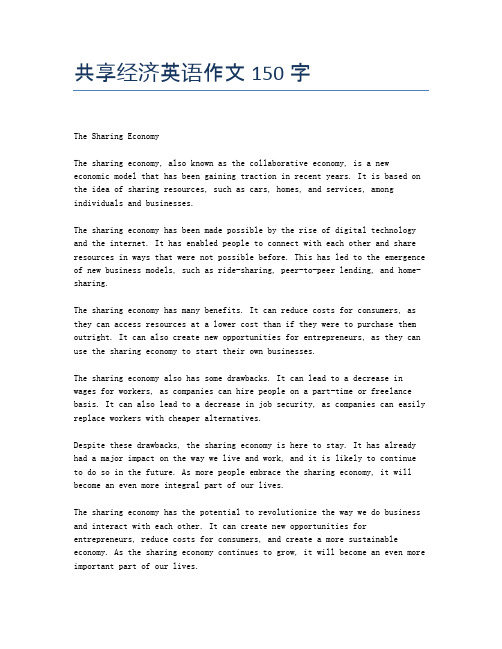
共享经济英语作文150字The Sharing EconomyThe sharing economy, also known as the collaborative economy, is a new economic model that has been gaining traction in recent years. It is based on the idea of sharing resources, such as cars, homes, and services, among individuals and businesses.The sharing economy has been made possible by the rise of digital technology and the internet. It has enabled people to connect with each other and share resources in ways that were not possible before. This has led to the emergence of new business models, such as ride-sharing, peer-to-peer lending, and home-sharing.The sharing economy has many benefits. It can reduce costs for consumers, as they can access resources at a lower cost than if they were to purchase them outright. It can also create new opportunities for entrepreneurs, as they can use the sharing economy to start their own businesses.The sharing economy also has some drawbacks. It can lead to a decrease in wages for workers, as companies can hire people on a part-time or freelance basis. It can also lead to a decrease in job security, as companies can easily replace workers with cheaper alternatives.Despite these drawbacks, the sharing economy is here to stay. It has already had a major impact on the way we live and work, and it is likely to continue to do so in the future. As more people embrace the sharing economy, it will become an even more integral part of our lives.The sharing economy has the potential to revolutionize the way we do business and interact with each other. It can create new opportunities for entrepreneurs, reduce costs for consumers, and create a more sustainable economy. As the sharing economy continues to grow, it will become an even more important part of our lives.。
共享经济英语作文短篇范文
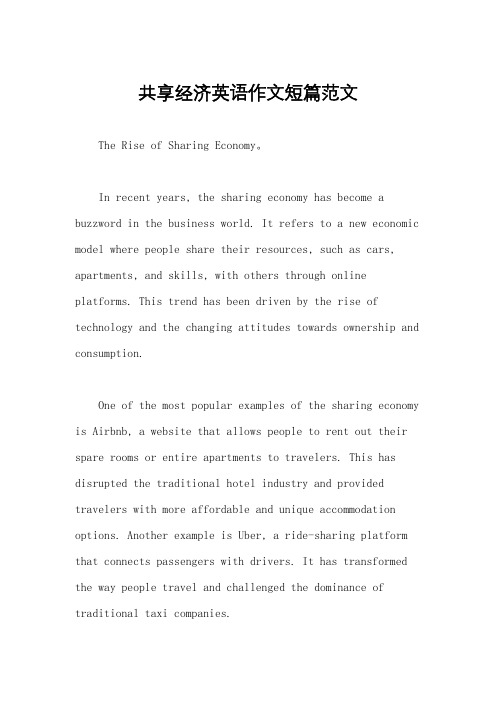
共享经济英语作文短篇范文The Rise of Sharing Economy。
In recent years, the sharing economy has become a buzzword in the business world. It refers to a new economic model where people share their resources, such as cars, apartments, and skills, with others through online platforms. This trend has been driven by the rise of technology and the changing attitudes towards ownership and consumption.One of the most popular examples of the sharing economy is Airbnb, a website that allows people to rent out their spare rooms or entire apartments to travelers. This has disrupted the traditional hotel industry and provided travelers with more affordable and unique accommodation options. Another example is Uber, a ride-sharing platform that connects passengers with drivers. It has transformed the way people travel and challenged the dominance of traditional taxi companies.The sharing economy has also created new opportunities for people to earn extra income and start their own businesses. For example, someone with a spare room can become a host on Airbnb and earn money by renting it out to travelers. Similarly, someone with a car can become adriver on Uber and earn money by providing rides to passengers.However, the sharing economy has also raised concerns about safety, regulation, and the impact on traditional industries. For example, some people have raised concerns about the safety of using services like Airbnb and Uber, as they are not subject to the same regulations and inspections as traditional hotels and taxis. Others have raised concerns about the impact on jobs and the economy, as the sharing economy may lead to the displacement of workers in traditional industries.In conclusion, the sharing economy is a new andexciting development in the business world. It has the potential to provide people with more affordable andflexible services, while also creating new opportunities for entrepreneurship and innovation. However, it is important to address the concerns and challenges that come with this new economic model to ensure that it benefits everyone involved.。
共享经济英文作文
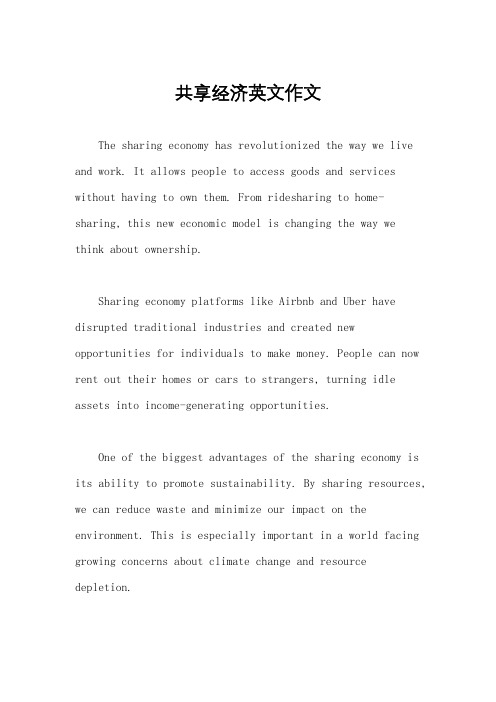
共享经济英文作文The sharing economy has revolutionized the way we live and work. It allows people to access goods and services without having to own them. From ridesharing to home-sharing, this new economic model is changing the way wethink about ownership.Sharing economy platforms like Airbnb and Uber have disrupted traditional industries and created new opportunities for individuals to make money. People can now rent out their homes or cars to strangers, turning idle assets into income-generating opportunities.One of the biggest advantages of the sharing economy is its ability to promote sustainability. By sharing resources, we can reduce waste and minimize our impact on the environment. This is especially important in a world facing growing concerns about climate change and resource depletion.The sharing economy also promotes a sense of community and connection among individuals. By sharing goods and services with others, we can build relationships and foster a sense of trust and cooperation. This can help strengthen social bonds and create a more inclusive society.However, the sharing economy is not without its challenges. Issues like safety, privacy, and regulation have all been raised as potential concerns. As the sharing economy continues to grow, it will be important for companies and policymakers to address these issues and ensure that users are protected.Overall, the sharing economy has the potential to create a more efficient, sustainable, and connected world. By embracing this new economic model, we can unlock new opportunities for innovation and collaboration. As we move forward, it will be important to strike a balance between the benefits of sharing and the need for regulation and oversight.。
共享经济的英语作文
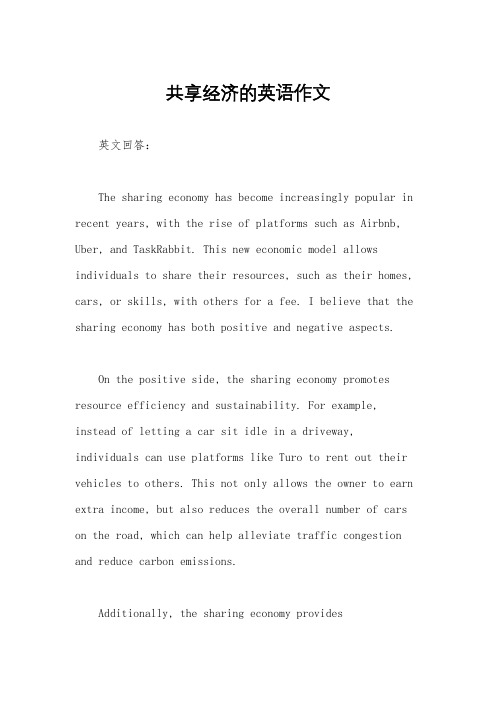
共享经济的英语作文英文回答:The sharing economy has become increasingly popular in recent years, with the rise of platforms such as Airbnb, Uber, and TaskRabbit. This new economic model allows individuals to share their resources, such as their homes, cars, or skills, with others for a fee. I believe that the sharing economy has both positive and negative aspects.On the positive side, the sharing economy promotes resource efficiency and sustainability. For example, instead of letting a car sit idle in a driveway, individuals can use platforms like Turo to rent out their vehicles to others. This not only allows the owner to earn extra income, but also reduces the overall number of cars on the road, which can help alleviate traffic congestion and reduce carbon emissions.Additionally, the sharing economy providesopportunities for individuals to earn extra income by monetizing their underutilized assets. For instance, someone with a spare room in their home can list it on Airbnb and earn money by hosting travelers. This can be particularly beneficial for people in need of extra cash or those looking to supplement their regular income.However, there are also drawbacks to the sharing economy. One concern is the lack of regulation and oversight, which can lead to safety and security issues. For example, there have been reports of Airbnb hosts experiencing property damage or encountering unruly guests. Similarly, the use of ride-sharing services has raised questions about insurance coverage and liability in the event of accidents.Furthermore, the sharing economy has the potential to disrupt traditional industries and negatively impact existing businesses. For instance, the rise of Airbnb has led to concerns about its impact on the hotel industry, as it provides an alternative accommodation option for travelers. Similarly, the popularity of ride-sharingservices has posed challenges for traditional taxi companies.In conclusion, the sharing economy has both benefits and drawbacks. While it offers opportunities for resource efficiency and extra income, it also raises concerns about regulation and its impact on traditional industries. As the sharing economy continues to grow, it will be important to address these challenges in order to ensure its long-term sustainability and positive impact on society.中文回答:共享经济近年来变得越来越受欢迎,随着Airbnb、Uber和TaskRabbit等平台的兴起。
我对共享经济的看法作文英文
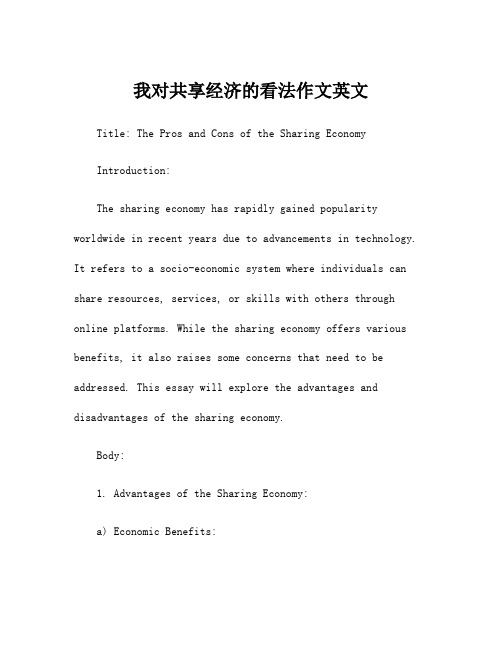
我对共享经济的看法作文英文Title: The Pros and Cons of the Sharing EconomyIntroduction:The sharing economy has rapidly gained popularity worldwide in recent years due to advancements in technology. It refers to a socio-economic system where individuals can share resources, services, or skills with others through online platforms. While the sharing economy offers various benefits, it also raises some concerns that need to be addressed. This essay will explore the advantages and disadvantages of the sharing economy.Body:1. Advantages of the Sharing Economy:a) Economic Benefits:- Cost Efficiency: Sharing resources allows individuals to access goods and services at a lower cost compared to traditional methods of ownership or acquisition. For example, ride-sharing platforms provide cheaper transportation alternatives, saving money for both passengers and drivers.- Additional Income: The sharing economy opens up new possibilities for individuals to generate income. People can monetize their under-utilized assets, such as spare rooms or cars, by renting them out through platforms like Airbnb or Turo. This enables them to earn extra money and provides economic opportunities for those in need.b) Environmental Benefits:- Resource Optimization: By sharing resources, the sharing economy encourages more efficient use of goods, reducing overconsumption and promoting sustainability. Sharing platforms allow multiple users to utilize the sameasset, thus minimizing waste and extending the lifecycle of products.- Reduced Carbon Footprint: Sharing platforms can contribute to a decrease in carbon emissions. Carpooling and bike-sharing services, for instance, help reduce private car usage and promote greener transportation options.c) Social Benefits:- Enhanced Social Connections: The sharing economy often fosters social interaction and community engagement. Platforms that connect people with similar interests, such as hobby-based sharing communities or co-working spaces, allow individuals to network and build connections beyond their immediate circles.- Access to Services: The sharing economy improves access to various services, especially in underserved areas. People in remote locations may benefit from services like peer-to-peer lending or crowdfunding, which provide financial opportunities that may not have been available otherwise.2. Disadvantages of the Sharing Economy:a) Regulatory Challenges:- Lack of Standardization: The sharing economy operates outside traditional regulatory systems, posing challenges for legislation. This can lead to issues regarding safety, taxes, insurance, and fair competition. Governments need to find a balance between encouraging innovation and protecting public interests.- Employee Protections: The rise of gig work and freelance jobs in the sharing economy has raised concerns about worker protections. Independent contractors may face unstable income, lack of benefits, and limited legal protection compared to traditional employment.b) Trust and Accountability:- Trust Issues: Engaging in peer-to-peer transactions through online platforms may raise concerns about trustworthiness, both for providers and users. Instances of fraud, theft, or misbehavior can occur, and establishing systems to ensure accountability and trust becomes crucial.- Quality Control: Ensuring consistent quality standards for goods and services in the sharing economy can be challenging. As the majority of interactions are between individuals, some platforms struggle with maintaining quality control and resolving disputes effectively.Conclusion:The sharing economy offers numerous advantages, such as cost efficiency, environmental sustainability, and increased social connections. However, it also presents challenges related to regulation, worker protections, trust, and accountability. Striking a balance between embracing the potential of the sharing economy while addressing theseissues is crucial for its sustainable growth. By utilizing effective regulations and innovative approaches, society can fully benefit from the sharing economy's potential while minimizing its drawbacks.。
中国共享经济作文英语范文

中国共享经济作文英语范文标题,The Sharing Economy in China。
The sharing economy, as a burgeoning economic model, has gained tremendous popularity in China in recent years. This phenomenon has revolutionized traditional industries, fostered innovation, and transformed the way people live and work. In this essay, we will delve into the various aspects of the sharing economy in China, examining its impact, challenges, and prospects.First and foremost, let's explore the concept of the sharing economy. The sharing economy, also known as collaborative consumption or peer-to-peer-based sharing, refers to an economic system where individuals or organizations share resources, such as goods, services, and expertise, often facilitated by digital platforms. This concept is deeply rooted in the principles of resource optimization, sustainability, and community building.China's rapid economic development and technological advancement have provided fertile ground for the growth of the sharing economy. With a large population and widespread internet penetration, China has witnessed the emergence of numerous sharing economy platforms across various sectors, including transportation, accommodation, finance, and even healthcare.One of the most prominent examples of the sharing economy in China is the rise of bike-sharing platforms. Companies like Mobike and Ofo have revolutionized urban transportation by providing convenient and affordable bike-sharing services. These platforms utilize GPS technologyand mobile payment systems to allow users to locate, unlock, and rent bikes with ease. As a result, commuting in congested cities has become more efficient and environmentally friendly.Furthermore, the sharing economy has also transformed the way people travel and book accommodations. Platformslike Airbnb and Tujia have disrupted the traditional hotel industry by enabling individuals to rent out their sparerooms or properties to travelers. This not only provides travelers with more diverse and personalized lodging options but also allows hosts to generate extra income from underutilized assets.In addition to transportation and accommodation, the sharing economy has extended its reach to other sectors as well. For instance, platforms like Didi Chuxing have revolutionized the ride-hailing industry, while companies like Tencent and Ant Group have pioneered the development of digital payment and financial services, making transactions more convenient and accessible to the masses.However, despite its many benefits, the sharing economy in China is not without its challenges. One of the main concerns is the issue of trust and safety. Since sharing economy transactions often involve interactions between strangers, there is a risk of fraud, theft, or misconduct. To address these concerns, sharing economy platforms must implement robust verification and security measures to protect users' safety and privacy.Another challenge facing the sharing economy in China is regulatory uncertainty. As the sharing economy continues to expand and disrupt traditional industries, policymakers are grappling with how to regulate these new business models effectively. Striking a balance between fostering innovation and protecting consumers' rights and interests is crucial for the sustainable development of the sharing economy.Despite these challenges, the sharing economy in China holds immense potential for growth and innovation. With the government's support and investment in digital infrastructure and entrepreneurship, the sharing economy is poised to become a driving force for economic development and social progress in China.In conclusion, the sharing economy has become an integral part of China's economic landscape, reshaping industries, and transforming the way people live and work. By harnessing the power of technology and collaboration, the sharing economy has the potential to drive inclusivegrowth, empower communities, and create a more sustainable future for all.。
共享经济英语作文十篇

共享经济英语作文十篇The Sharing Economy。
In recent years, the sharing economy has become a popular trend all over the world. It refers to a system in which people share goods, services, and resources with each other through various platforms. The sharing economy has brought about many benefits, such as reducing waste, saving money, and promoting social interaction. However, it also poses some challenges, such as legal issues, safety concerns, and ethical dilemmas.One of the most popular forms of the sharing economy is ride-sharing, which allows people to share rides with each other using apps like Uber and Lyft. This has made transportation more affordable and convenient for many people, especially in urban areas where public transportation is limited. However, it has also raised concerns about safety and liability, as well as the impact on traditional taxi drivers.Another form of the sharing economy is home-sharing, which allows people to rent out their homes or apartmentsto travelers through platforms like Airbnb. This has provided travelers with more affordable and authentic accommodation options, while also allowing homeowners to earn extra income. However, it has also raised concerns about the impact on local housing markets, as well assafety and liability issues.The sharing economy has also extended to other areas, such as food-sharing, where people can share meals witheach other through apps like Meal Sharing, and tool-sharing, where people can borrow and lend tools through platformslike Toolzdo. These forms of sharing have helped to reduce waste and promote sustainability, while also fosteringsocial connections and community building.However, the sharing economy also faces some challenges. One of the biggest challenges is legal issues, as many sharing economy platforms operate in a gray area of the law. For example, home-sharing is often regulated differentlyfrom traditional hotels, which can lead to confusion and conflict. Additionally, safety concerns and liability issues have arisen in some cases, such as when a ride-sharing driver is involved in an accident.Another challenge is ethical dilemmas, such as the impact on traditional industries and workers. For example, the rise of ride-sharing has led to protests from traditional taxi drivers who feel that their livelihoods are threatened. Similarly, the rise of home-sharing has raised concerns about the impact on local housing markets and the availability of affordable housing.In conclusion, the sharing economy has brought about many benefits, such as reducing waste, saving money, and promoting social interaction. However, it also poses some challenges, such as legal issues, safety concerns, and ethical dilemmas. As the sharing economy continues to grow and evolve, it will be important to address these challenges in a responsible and sustainable way.。
共享经济英语作文

共享经济英语作文In this section, you have 30 minutes to write an essay about the sharing economy. Your article should include the benefits and limitations of the sharing economy. Write your essay on Answer Sheet 1. You should write at least 150 words, but no more than 200 words.On sharing economyAs we all know, sharing economy refers to people selling or purchasing idle resources through online transactions. Sharing economy has become a new trend and plays an increasingly important role in our modern life. There is no doubt that many people have benefited greatly from the sharing economy. Most importantly, it helps to make better use of resources. Those who have something available that they don't use for the time being can sell or rent it to others who need it. So it's good for both parties, because not only can the seller or tenant make money, but the buyer can save money. In addition, it ensures that items can be used as many times as possible rather than abandoned. In addition, it helps to build trust between each other.However, the rise of the sharing economy has led to management difficulties. For example, bike sharing brings convenience to people, but people place bicycles at will and even occupy the space of sidewalk. Therefore, how to manage the shared things is worth considering.ome Jobs Are Newly HeuristicHeuristic work has little structure andrequires a high degree of creative thinking. The word heuristic comes from the Greek heuriskein ―to discover and learn. Don't think only of the Madison Avenue types brainstorming over some wildly innovative ad campaign for a client. In sales, marketing, medicine, architecture, design, computer science, planning, management, and hundreds of other job types, heuristic workers create important knowledge for firms ranging from HR policies, procedure manuals, and complex sales contracts to new products and business strategies. Heuristic work is almost impossible to automate, notwithstan...In this section, you have 30 minutes to write an essay about the sharing economy. Your article should include the benefits and limitations of the sharing economy. Write your essay on Answer Sheet 1. You should write at least 150 words, but no more than 200 words.On sharing economyAs we all know, sharing economy refers to people selling or purchasing idle resources through online transactions. Sharing economy has become a new trend and plays an increasingly important role in our modern life. There is no doubt that many people have benefited greatly from the sharing economy. Most importantly, it helps to make better use of resources. People who have something available but don't use it temporarily can sell or rent it to others who need it. So it's good for both parties, because not only can the seller or tenant make money, but thebuyer can save money. In addition, it ensures that items can be used as many times as possible rather than abandoned. In addition, it helps to build trust between each other.However, the rise of the sharing economy has led to management difficulties. For example, bike sharing brings convenience to people, but people place bicycles at will and even occupy the space of sidewalk. Therefore, how to manage the shared things is worth considering.。
共享经济的影响英语作文
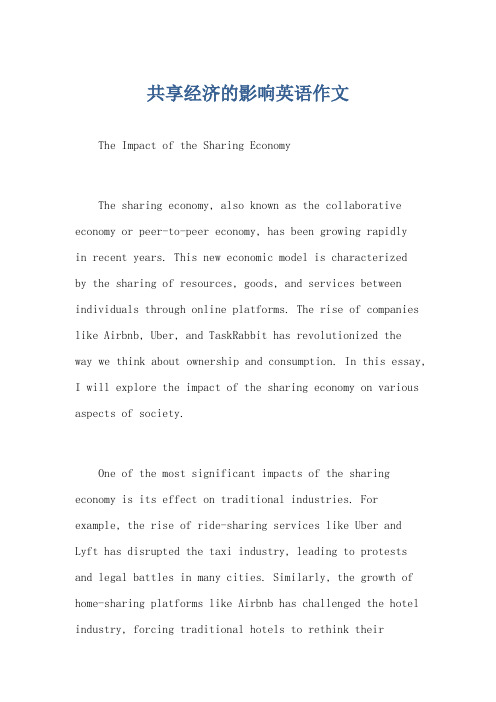
共享经济的影响英语作文The Impact of the Sharing EconomyThe sharing economy, also known as the collaborative economy or peer-to-peer economy, has been growing rapidlyin recent years. This new economic model is characterizedby the sharing of resources, goods, and services between individuals through online platforms. The rise of companies like Airbnb, Uber, and TaskRabbit has revolutionized theway we think about ownership and consumption. In this essay, I will explore the impact of the sharing economy on various aspects of society.One of the most significant impacts of the sharing economy is its effect on traditional industries. For example, the rise of ride-sharing services like Uber andLyft has disrupted the taxi industry, leading to protests and legal battles in many cities. Similarly, the growth of home-sharing platforms like Airbnb has challenged the hotel industry, forcing traditional hotels to rethink theirbusiness models. While these disruptions have caused some controversy, they have also created new opportunities for innovation and entrepreneurship.Another key impact of the sharing economy is its potential to promote sustainability and reduce waste. By encouraging the sharing of resources and goods, the sharing economy can help to reduce the environmental impact of overconsumption. For example, car-sharing services can help to reduce the number of cars on the road, leading to lower emissions and less traffic congestion. Similarly, the sharing of goods like tools, clothing, and appliances can help to extend the lifespan of these items and reduce the need for new production.The sharing economy also has the potential to promote social inclusion and economic empowerment. By providing opportunities for individuals to share their resources and skills, the sharing economy can help to create new sources of income for people who may not have access to traditional employment opportunities. For example, platforms likeTaskRabbit allow individuals to offer their services for tasks like cleaning, moving, and handyman work, providing a flexible source of income for those who may not have a traditional job.In addition to these economic and social impacts, the sharing economy also raises important questions about regulation and governance. As sharing economy platforms continue to grow in popularity, policymakers and regulators are faced with the challenge of ensuring that these platforms operate fairly and transparently. Issues like worker rights, consumer protection, and tax compliance are all important considerations in the sharing economy, and policymakers must work to strike a balance betweenfostering innovation and protecting the public interest.In conclusion, the sharing economy has the potential to bring about significant changes in our society. From disrupting traditional industries to promotingsustainability and social inclusion, the sharing economy offers a new way of thinking about ownership andconsumption. As this new economic model continues to evolve, it will be important for policymakers, businesses, and individuals to work together to ensure that the benefits of the sharing economy are shared equitably and sustainably.。
共享经济利弊英语作文
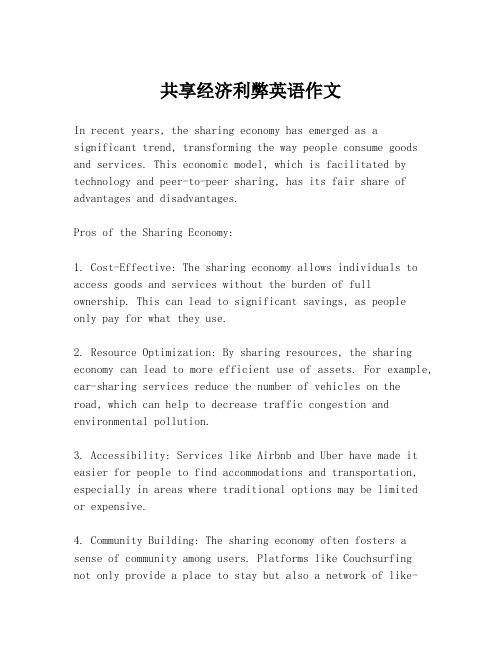
共享经济利弊英语作文In recent years, the sharing economy has emerged as a significant trend, transforming the way people consume goods and services. This economic model, which is facilitated by technology and peer-to-peer sharing, has its fair share of advantages and disadvantages.Pros of the Sharing Economy:1. Cost-Effective: The sharing economy allows individuals to access goods and services without the burden of full ownership. This can lead to significant savings, as peopleonly pay for what they use.2. Resource Optimization: By sharing resources, the sharing economy can lead to more efficient use of assets. For example, car-sharing services reduce the number of vehicles on the road, which can help to decrease traffic congestion and environmental pollution.3. Accessibility: Services like Airbnb and Uber have made it easier for people to find accommodations and transportation, especially in areas where traditional options may be limitedor expensive.4. Community Building: The sharing economy often fosters a sense of community among users. Platforms like Couchsurfingnot only provide a place to stay but also a network of like-minded individuals.5. Entrepreneurial Opportunities: The sharing economy has opened up new avenues for entrepreneurship. Many individuals have turned their homes into guest houses or their cars into taxis, creating new income streams.Cons of the Sharing Economy:1. Regulatory Challenges: The rapid growth of the sharing economy has outpaced regulatory frameworks, leading to legal battles and market disruptions. Companies like Uber and Airbnb have faced significant pushback from traditional industry players.2. Job Security and Worker Rights: Critics argue that the sharing economy can lead to precarious employment conditions. Workers in the gig economy often lack benefits and job security, which can have negative implications for society.3. Data Privacy Concerns: The sharing economy relies heavily on digital platforms, which collect vast amounts of personal data. There are concerns about how this data is used and protected, especially in light of increasing cyber threats.4. Quality Control: Without a centralized authority, it can be difficult to maintain consistent quality standards. Consumers may face risks when the goods or services provided do not meet expected standards.5. Economic Disruption: Established businesses have beendisrupted by the sharing economy, leading to job losses and economic upheaval in certain sectors. This can have a significant impact on local economies and traditional industries.In conclusion, the sharing economy presents bothopportunities and challenges. While it offers convenience and cost savings, it also raises concerns about regulation, labor rights, and privacy. As this economic model continues to evolve, it will be crucial for stakeholders to find a balance that maximizes the benefits while mitigating the potential downsides.。
- 1、下载文档前请自行甄别文档内容的完整性,平台不提供额外的编辑、内容补充、找答案等附加服务。
- 2、"仅部分预览"的文档,不可在线预览部分如存在完整性等问题,可反馈申请退款(可完整预览的文档不适用该条件!)。
- 3、如文档侵犯您的权益,请联系客服反馈,我们会尽快为您处理(人工客服工作时间:9:00-18:30)。
SHARING ECONOMY BUSINESS MODEL AND VALUE CREATING Case study on car-sharingSihui ZHAOPEG3 Classique Graduate levelMaster in ManagementProfesseur Tutor: FOX-MURATON Melissa29/01/2015TABLE OF CONTENT⏹ Research Context⏹ Research Objective⏹ Methodology⏹ Structure of thesis⏹ Findings⏹ ConclusionPeer-to-Peer EconomyRESEARCHCONTEXTcollaborative consumptionRelationship economyAccess EconomySharing EconomyWHAT?Economic model based on “Access to” rather than “Ownership of” physical and human assets like time, space and skills.They make use of idle assets and create new marketplaces.Sharing EconomyIn other word, it involves using online platform and internet technology as tools to connect distributed groups of people to match millions of haves with millions of needs, immediately and efficiently.MODEAIMWHERE?Sharing EconomyWHY?Peer to peer payment systems Reduced transaction costs Peer to peer social networking Innovative mobile technologiesDRIVERS OF SHARING ECONOMYIncreasing Population Density Need for more Resources Desire for community Consumerist Culture7 times more devices than people by 2020Monetize Excess or Idle InventoryIncrease Financial Flexibility Access Over Ownership Influx of VC Funding$ 2.46 billion funding inSharing economy startups in the last 7 MONTHSWorld population will be 9.3BILLION by 2050DRIVERS: T. E. S.Opportunities in Car Sharing 2020: Carsharing to emerge as additional business opportunity for automotive manufacturer for customer retention and long term sustainabilityGlobal Carsharing Outlook, Number of Members and Vehicles, 2006-2014(Source: Frost and Sullivan)Carsharing Market:Carsharing Vehicles and Members Growth, Global, 2010–2020① MemberCarsharing subscriber base to be 14 Million in EU by 2020200,000 shared vehicles expected in Europe by 2020France, United Kingdom, Germany and Switzerlandto hold around 75% of revenue share in 2016By 2016, 1 in 5 vehicles of the carsharing vehicle fleet is expected to be a battery powered EVThe revenue potential of carsharing market is expected to be €7 Billion by 2020 in EuropeVehiclePotential MarketUsage of Electric VehicleRevenue Generation⑤② ③ ④WHO?Communication technology supportCommunicationtechnology supportCUSTOMERCUSTOMER PARTICIPANTsprovides a new way of thinking about business, exchange, value and community. Enabled by internettechnologiesConnecting distributednetworks of peopleand/or assets(Mine,yours, ours)Making use of the idling capacity oftangible and intangible assetsEncouragingmeaningfulinteractions and trustEmbracing openness,inclusivity and thecommonsThe sharing economy CharacteristicsRESEARCH OBJECTS This study conducted exploratory and descriptive research on the innovation business model of Car-sharing to gain an well understanding of how such emerging consumption business model are shaped and how value creation it producesTo develop an understanding of the different between Traditional car consumption and Car-sharing consumptionmodel.To identify Car-Sharing Value Creation by NICEframeworks;To recognize the appropriate methods when applies Car-sharing value; from business, operation and customer strategyviews;Specific objectives of the study contain :M E T H O D O L O G YIntegrated Theory: Business Model Design; Value creation;Data collection; Data reduction; Data analysis;Theory StudyResearch ObjectiveEmpirical DataPrimarily problemGenerative modelBusiness model:key choices, components, ecosystem, environment, innovation elementsValue creation: Value chain,Value framework•Actors•Relationship •Mechanisms •Environment •ChallengeFind the way to answer research questions posed by the research: •What are the activities, entities, processes, and forces and the contexts that influenced, enabled, or constrained car-sharing?•What are the opportunities for the new comers to car-sharing? What the strategic options for the companies? What the market situation and thecontext of the car-sharing business?•What’s the core value of car-sharing and what the value creation model based on the car-sharing business? Who are the key players and components incarsharing business?•How to operate with outstanding execution underlying good idea? What are the correspondent strategies to figure out the challenges?S T R U C T U R E O F T H E S I SThe theory research of sharing economy development and theapplication of sharing economy business modelValue net model ofsharing economy business modelTheory studyModel frameworkBusiness modelCase studyFinding &ConclusionHow does sharing economy business model succeed in performing value creating and implementing in car-sharing business?Study ObjectiveSharing economyValue netCase studyValue creationBusiness modelstrategyValue model of car-sharing businessContextAnalysis of findings; conclusion and suggestionQuestionFINDINGFINDINGSThe car-sharing business model innovation is based on the role transformation of customers.CUSTOMERMARKETPROCESS OTHERPARTICIPANTSPRODUCT OR SERVICESOCIAL ENVIRONMENTService innovation;Potential bargain space;Collaborative consumption;Characteristics;access over ownershipBased on the internet and network terminal;No boarder of the transaction time and place;Customer driverAccurate market segmentation Car-sharing;ride-sharing; mobility-sharing;redistribution; Long life timeTransaction activity between individuals;Needs and haves self-match systemTransaction online platform;social networking services;credit supervisoryorganization; partnership;terminal manufacturerSustainable consumption;Sharing spiritCUSTOMERMARKETPROCESS OTHERPARTICIPANTSPRODUCTOR SERVICESOCIALENVIRONMENTMARKETPLACEPRODUTSSERVICEProvide a platform Company as a serviceMotivate a marketplace Sharing economyCustomer-Oriented0 0.511.522.533.544.5O f f e r i n g L e v e lCompeting Factors Traditional transportation Traditional car renting Car/Ride-sharing•Novelty- adopt innovative content, structure or governance•Lock-In – build in elements to retain business model stakeholders•Complementarities – bundle activities to generate more value•Efficiency– reorganize activities to reduce transaction costsCustomer is the core value source of the sharing economy business and it is the motivator and revolutionary of the newconsumption model.First, customer has more initiatives and each one could be the potential provider and user. Customer owns value, deliver value,create value andmaintain value.Second, Most of thecar-sharing companiesbegin to act as amediator or aplatform to match theneeds and haves.Third, the ecosystemof the car-sharingbusiness has thenature of trustestablishing.C O N CL USI ONTraditional company managers and star-ups directors, who want to share a cake in thesharing economy market, will benefit from the studyThe study’s focus on sharing economy development highlights the new consumption mode and motivates the sustainable economic seeking in the future. The sharing economy seeks to dig out the new consumption model by unlocking the value of idle and redistribution the social resources more sustainably.T H A N K S。
